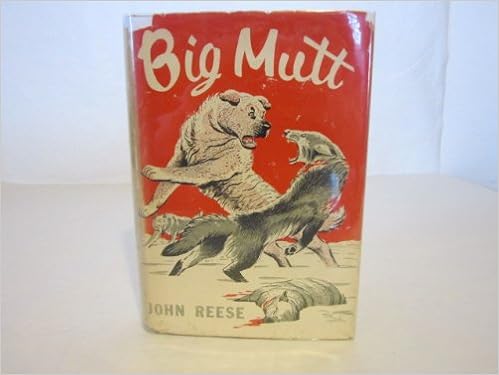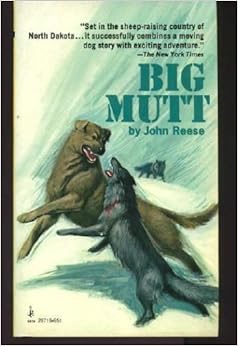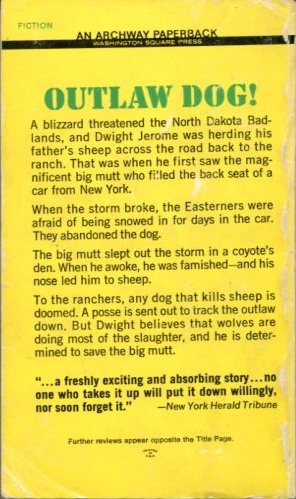 Big Mutt
Big MuttJohn Reese, il. Rod Ruth
1952, The Westminster Press
It was not the kindest thing to dump a soft, spoiled, city-raised dog out in this lean sheep country, in the worst blizzard the Northwest had known in a generation.
But they did it.
A vacationing New York City couple, spooked by a massive winter storm bearing down on them and tired of dealing with the enormous mutt the wife had adopted as a cute puppy, abandon their dog in the Badlands of North Dakota. In January.
The dog, a mongrel with apparent strains of Great Dane, German Shepherd, and just plain hound, is forced to fend for himself. Unfamiliar with the wild and drawn to humans, he soon begins killing sheep for food. As a brutal winter settles over the landscape, the dog's attacks on their flocks enrage the local shepherds. The situation intensifies as packs of wolves drift south from Canada, which has been hit even harder by the weather, and also begin killing sheep.
"Dwight would have made a good Indian fighter... or a good Indian," he said. "He's more at home with nature than any person I have ever known."
15-year-old Dwight Jerome, son of a sheepman, encounters the big dog early on, when he's still a pet traveling with his Eastern owners. Dwight doesn't forget him, and when a large dog begins killing sheep, he suspects who it is. Already the owner of a large dog - an Irish Wolfhound named Colleen - Dwight is drawn to the big mutt. The dog, he can tell from glimpses of him running wild and from the signs left behind, is the sort of smart, eager hunter he'd wanted when he bought Colleen. And when boy and dog encounter the big stray and a pair of wolves, the fight brings out the hunter in Colleen:
The wolfhound was bred for the show ring, but no one had to tell her what to do now. She had never hunted real wolves. She had never hunted with another dog, and she had never seen this big mutt before. Yet, instead of going to his side, she made straight for the wolves, counting on the big mutt to attack from his side. They worked as a team, instinct responding to instinct.
An old-school dog story, where the boy hero learns to be a man and the wild dog finds his master this is a well-written and fast-paced book with some modern attitudes about the stresses of humans sharing space with wild animals, but a decidedly non-modern attitude about wolves:
Now he knew it was wolves. Not coyotes, but those big Saskatchewan cruisers they used to have here in the old days, when his father was a boy - shrewd, smart, savage killers who could hunt alone or in pairs, or in whole family packs. No more vicious killer lived in nature.
The POV moves effortlessly from dog to boy to the young deputy sheriff who's trying track and kill the dog. Women are generally faceless - Dwight's little sisters, his mother, the pretty schoolteacher. The father - who has a personality, versus his mother - has a final comment on dogs, and the harsh winter:
When the history of this greatest of all storms is written, let no one forget the heroism of the sheep dogs of the West. We know what they've done for us, and we're just a small corner of the land covered by this storm. All over the range country dogs have died this way, cut up by wolves and coyotes and lions, frozen with their flocks, starved when they could have come in without their sheep.
About the Author
1910-1981
John Henry Reese was born in Nebraska and was primarily a writer of Westerns. He wrote a few other books for children, including Three Wild Ones (1963) about a rebellious teenager and a colt.
Links
Wikipedia on Reese
Other editions



